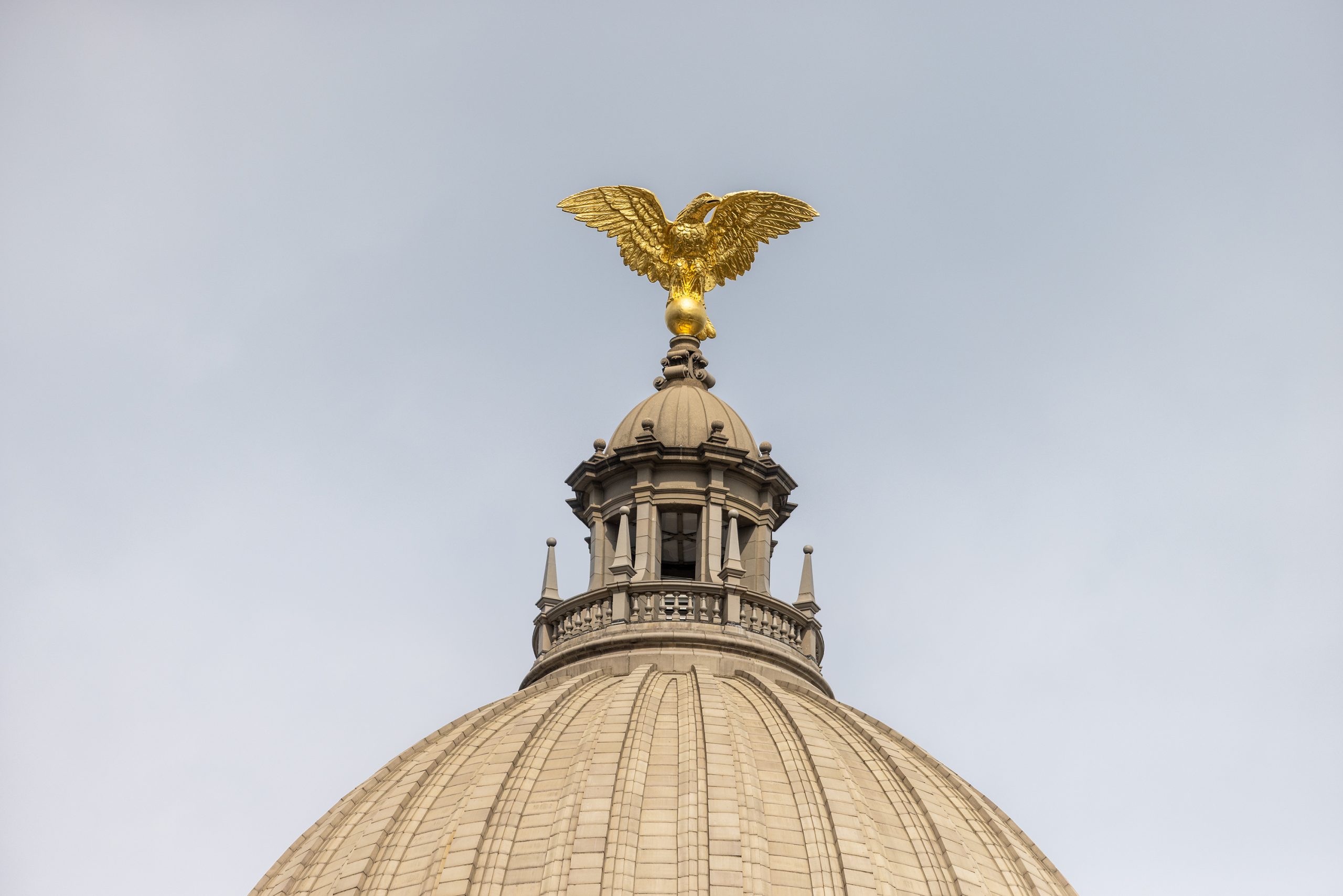Mississippi Today
Lawmakers pass largest budget in state history. No tax cuts or refunds, more for schools and roads

Lawmakers pass largest budget in state history. No tax cuts or refunds, more for schools and roads
After bitter arguments, stalemates and blown deadlines the Mississippi Legislature pulled an all-nighter and passed a state budget of $7.6 billion early Saturday morning, the largest budget — not counting federal funds — in the state's history.
It includes a roughly $120 million increase in public K-12 education spending, an extra $620 million for road work and a $104 million bailout of the state's struggling hospitals. It also includes more than $600 million for individual lawmakers' projects this election year.
Despite pleas from hospitals, health advocates and some lawmakers, the Legislature again refused to expand Medicaid coverage — for which it would receive more than $1 billion a year in federal money — to cover working poor Mississippians and help hospitals struggling to provide care to the indigent.
The budget includes no new major tax cuts or refunds for Mississippians, despite vows by Gov. Tate Reeves, House Speaker Philip Gunn and Lt. Gov. Delbert Hosemann early in the year to provide relief for taxpayers.
Hosemann had proposed a one-time rebate check for Mississippi taxpayers or cutting the state's highest-in-the-nation tax on groceries. Reeves and Gunn proposed a phase-out of the state's personal income tax. No agreement was reached, and no tax break was passed, although lawmakers last year enacted the largest income tax cut in state history, still being phased in.
After much dickering that held up other budget work late in the session, lawmakers on Friday night agreed to spend about $3 billion on K-12 education, an increase over this year of about $120 million.
The Senate had proposed revamping the state's adequate education formula and fully funding it for the first time in years, which would have cost about $181 million. The House refused to add more money to the Mississippi Adequate Education Program formula, pushing instead for Legislature-directed spending for schools, including a $22-million raise for teachers' assistants.
Neither agreed to the other's proposals and in final negotiations agreed to provide an extra $100 million divided among schools based on numbers of students, with few restrictions other than the money cannot go to pay increases for superintendents, assistant superintendents and principals.
“This was a way to get a compromise,” Senate Education Chairman Dennis DeBar told his colleagues. “It's almost the same effect as if it was in the (MAEP) formula.”
Most of the balance of the schools increase — about $17 million — is to cover increased insurance costs for education employees.
“I am pleased with it,” said House Education Chairman Richard Bennett. “I would have loved to fund raises for teachers' assistants, but it's a give and take … We've all got to sit down next year and look at the (MAEP) formula and what we need to change.”
Hosemann and Gunn said they were pleased with the final budget.
“From a $600 million-plus infrastructure plan to legislation strengthening our elections process, providing options for the continued collaboration of hospitals, and increasing the number of doctors and nurses in Mississippi, the session has been an overwhelming success,” Hosemann said. “The state is in excellent fiscal condition, we are paying off debt, our personal and business taxes are decreasing, and we have adopted a conservative budget which funds necessary services.
“I am particularly proud of the Senate's earlier 52-0 commitment to fully funding the education of our children,” Hosemann said. “Our senators' leadership on this issue resulted in an additional $100 million for our schools, which will fund local supplements for teachers, classroom supplies, diesel for buses, and all the other things necessary to providing every child in Mississippi with an opportunity for a first-class education.”
House Speaker Philip Gunn, who is not running for reelection and was presiding over his final regular session, said of the budget, “I think it meets a lot of needs across the state. We put another $100 million in public education. We are proud to be able to do that.”
This year's legislative session also saw some of the worst partisan, racial and geographic division and argument in recent years, mostly centered around measures aimed at state takeover of policing, courts and infrastructure in the capital city of Jackson.
At a press conference Friday night, Democratic leaders Sen. Derrick Simmons and Rep. Robert Johnson III said Republican leaders wasted too much time and lucre on “targeting Jackson” and instead should have focused on the needs of average Mississippians.
“We had a $4 billion surplus and we wouldn't even fully fund MAEP, provide money for hospitals and provide the kind of support Jackson needs,” Johnson said.
“Eighty percent of Mississippians want Medicaid expansion,” Simmons said. “Seventy nine percent want our schools fully funded. Another over 70% want us to restore the ballot initiative process. But what have we done here for 90 days? We spent our time dealing with bills targeting the city of Jackson … It's an insult. This is an election year. … One thing that scares a politician is the fear of not being reelected … If you want Medicaid expansion, if you want the ballot initiative restored, if you want your schools fully funded, Democrats have supported that year after year.”
The Legislature appropriated $7 million in one fund for relief for residents impacted by the tornadoes that ripped through north Mississippi earlier this month killing at least 21 people and $7 million in another fund for housing for those impacted by the storms. In addition, $3 million was appropriated for the schools to help pay their damages from the tornadoes and $1.5 million for hospitals that suffered damages.
Legislators worked overnight Friday well into Saturday morning to fund dozens of pet projects throughout the state.
In an item separate from the budget, the Legislature did not pass any bills to restore voting rights to people who lost their right to vote because of a felony conviction. The House sent four bills to the Senate restoring voting rights, but Senate Judiciary B Chair Joey Fillingane opted not to bring any of those up for considerations before the full Senate.
Most years the Legislature passes a handful of suffrage bills (normally about five) each session.
This article first appeared on Mississippi Today and is republished here under a Creative Commons license.
Mississippi Today
2024 Mississippi legislative session not good for private school voucher supporters
Despite a recent Mississippi Supreme Court ruling allowing $10 million in public money to be spent on private schools, 2024 has not been a good year for those supporting school vouchers.
School-choice supporters were hopeful during the 2024 legislative session, with new House Speaker Jason White at times indicating support for vouchers.
But the Legislature, which recently completed its session, did not pass any new voucher bills. In fact, it placed tighter restrictions on some of the limited laws the state has in place allowing public money to be spent on private schools.
Notably, the Legislature passed a bill that provides significantly more oversight of a program that provides a limited number of scholarships or vouchers for special-needs children to attend private schools.
Going forward, thanks to the new law, to receive the vouchers a parent must certify that their child will be attending a private school that offers the special needs educational services that will help the child. And the school must report information on the academic progress of the child receiving the funds.
Also, efforts to expand another state program that provides tax credits for the benefit of private schools was defeated. Legislation that would have expanded the tax credits offered by the Children's Promise Act from $8 million a year to $24 million to benefit private schools was defeated. Private schools are supposed to educate low income students and students with special needs to receive the benefit of the tax credits. The legislation expanding the Children's Promise Act was defeated after it was reported that no state agency knew how many students who fit into the categories of poverty and other specific needs were being educated in the schools receiving funds through the tax credits.
Interestingly, the Legislature did not expand the Children's Promise Act but also did not place more oversight on the private schools receiving the tax credit funds.
The bright spot for those supporting vouchers was the early May state Supreme Court ruling. But, in reality, the Supreme Court ruling was not as good for supporters of vouchers as it might appear on the surface.
The Supreme Court did not say in the ruling whether school vouchers are constitutional. Instead, the state's highest court ruled that the group that brought the lawsuit – Parents for Public Schools – did not have standing to pursue the legal action.
The Supreme Court justices did not give any indication that they were ready to say they were going to ignore the Mississippi Constitution's plain language that prohibits public funds from being provided “to any school that at the time of receiving such appropriation is not conducted as a free school.”
In addition to finding Parents for Public Schools did not have standing to bring the lawsuit, the court said another key reason for its ruling was the fact that the funds the private schools were receiving were federal, not state funds. The public funds at the center of the lawsuit were federal COVID-19 relief dollars.
Right or wrong, The court appeared to make a distinction between federal money and state general funds. And in reality, the circumstances are unique in that seldom does the state receive federal money with so few strings attached that it can be awarded to private schools.
The majority opinion written by Northern District Supreme Justice Robert Chamberlin and joined by six justices states, “These specific federal funds were never earmarked by either the federal government or the state for educational purposes, have not been commingled with state education funds, are not for educational purposes and therefore cannot be said to have harmed PPS (Parents for Public Schools) by taking finite government educational funding away from public schools.”
And Southern District Supreme Court Justice Dawn Beam, who joined the majority opinion, wrote separately “ to reiterate that we are not ruling on state funds but American Rescue Plan Act (ARPA) funds … The ARPA funds were given to the state to be used in four possible ways, three of which were directly related to the COVID -19 health emergency and one of which was to make necessary investments in water, sewer or broadband infrastructure.”
Granted, many public school advocates lamented the decision, pointing out that federal funds are indeed public or taxpayer money and those federal funds could have been used to help struggling public schools.
Two justices – James Kitchens and Leslie King, both of the Central District, agreed with that argument.
But, importantly, a decidedly conservative-leaning Mississippi Supreme Court stopped far short – at least for the time being – of circumventing state constitutional language that plainly states that public funds are not to go to private schools.
And a decidedly conservative Mississippi Legislature chose not to expand voucher programs during the 2024 session.
This article first appeared on Mississippi Today and is republished here under a Creative Commons license.
Mississippi Today
On this day in 1925


MAY 19, 1925

Malcolm X was born Malcolm Little in Omaha, Nebraska. When he was 14, a teacher asked him what he wanted to be when he grew up and he answered that he wanted to be a lawyer. The teacher chided him, urging him to be realistic. “Why don't you plan on carpentry?”
In prison, he became a follower of Nation of Islam leader Elijah Muhammad. In his speeches, Malcolm X warned Black Americans against self-loathing: “Who taught you to hate the texture of your hair? Who taught you to hate the color of your skin? Who taught you to hate the shape of your nose and the shape of your lips? Who taught you to hate yourself from the top of your head to the soles of your feet? Who taught you to hate your own kind?”
Prior to a 1964 pilgrimage to Mecca, he split with Elijah Muhammad. As a result of that trip, Malcolm X began to accept followers of all races. In 1965, he was assassinated. Denzel Washington was nominated for an Oscar for his portrayal of the civil rights leader in Spike Lee's 1992 award-winning film.
This article first appeared on Mississippi Today and is republished here under a Creative Commons license.
Did you miss our previous article…
https://www.biloxinewsevents.com/?p=359877
Mississippi Today
On this day in 1896


MAY 18, 1896

The U.S. Supreme Court ruled 7-1 in Plessy v. Ferguson that racial segregation on railroads or similar public places was constitutional, forging the “separate but equal” doctrine that remained in place until 1954.
In his dissent that would foreshadow the ruling six decades later in Brown v. Board of Education, Justice John Marshall Harlan wrote that “separate but equal” rail cars were aimed at discriminating against Black Americans.
“In the view of the Constitution, in the eye of the law, there is in this country no superior, dominant, ruling class of citizens,” he wrote. “Our Constitution in color-blind and neither knows nor tolerates classes among citizens. In respect of civil rights, all citizens are equal before the law. The humblest is the peer of the most powerful. The law … takes no account of his surroundings or of his color when his civil rights as guaranteed by the supreme law of the land are involved.”
This article first appeared on Mississippi Today and is republished here under a Creative Commons license.
Did you miss our previous article…
https://www.biloxinewsevents.com/?p=359301
-
SuperTalk FM7 days ago
Martin Lawrence making 3 stops in Mississippi on comedy tour
-
Our Mississippi Home6 days ago
Beat the Heat with Mississippi’s Best Waterparks
-
SuperTalk FM3 days ago
State auditor cracking down on Mississippians receiving unemployment benefits
-
Our Mississippi Home7 days ago
Charlie’s U-Pik: Opening Soon for the Summer Season
-
Mississippi News Video5 days ago
Jackson has a gang problem
-
Kaiser Health News6 days ago
Medicaid ‘Unwinding’ Decried as Biased Against Disabled People
-
Local News2 days ago
Family files lawsuit after teen’s suicide in Harrison County Jail
-
Mississippi Today4 days ago
On this day in 1950






































